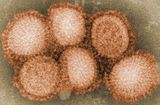Influenza A virus subtype H10N7

| Influenza A virus subtype H10N7 | |
|---|---|
| Virus classification | |
| (unranked): | Virus |
| Realm: | Riboviria |
| Kingdom: | Orthornavirae |
| Phylum: | Negarnaviricota |
| Class: | Insthoviricetes |
| Order: | Articulavirales |
| Family: | Orthomyxoviridae |
| Genus: | Alphainfluenzavirus |
| Species: | |
| Serotype: | Influenza A virus subtype H10N7 |
| Influenza (flu) |
|---|
 |
Influenza A virus subtype H10N7 (A/H10N7) is a subtype of the species Influenza A virus (sometimes called bird flu virus). H10N7 was first reported in humans in Egypt in 2004.[1] It caused illness in two one-year-old infants, and residents of Ismailia, Egypt; one child's father, and a poultry merchant.[2]
The first reported H10N7 outbreak in the US occurred in Minnesota on two turkey farms in 1979 and on a third in 1980. "The clinical signs ranged from severe, with a mortality rate as high as 31%, to subclinical. Antigenically indistinguishable viruses were isolated from healthy mallards on a pond adjacent to the turkey farms".[3]
The Influenza A (H10N7) virus was also held responsible for an increased mortality of harbour seals (Phoca vitulina) in Europe in 2014.[4] First cases were reported in spring 2014 in Sweden and subsequently spread to Denmark.[5][6] Within a few months the virus spread to the Wadden Sea area of Germany and the Netherlands causing the death of about 10% of the local harbour seal population.[7]
References
[edit]- ^ Wright PF, Neumann G, Kawaoka Y (2013). "41-Orthomyxoviruses". In Knipe DM, Howley PM (eds.). Fields Virology. Vol. 1 (6th ed.). Philadelphia, PA: Wolters Kluwer/Lippincott Williams & Wilkins. p. 1201. ISBN 978-1-4511-0563-6.
- ^ "EID Weekly Updates – Emerging and Reemerging Infectious Diseases, Region of the Americas". Pan American Health Organization. 7 May 2004. Retrieved 20 October 2007.
- ^ Karunakaran D, Hinshaw V, Poss P, Newman J, Halvorson D (1983). "Influenza A outbreaks in Minnesota turkeys due to subtype H10N7 and possible transmission by waterfowl". Avian Dis. 27 (2): 357–66. doi:10.2307/1590162. JSTOR 1590162. PMID 6870718.
- ^ Bodewes, Rogier; Zohari, Siamak; Krog, Jesper S.; Hall, Matthew D.; Harder, Timm C.; Bestebroer, Theo M.; Bildt, Marco W. G. van de; Spronken, Monique I.; Larsen, Lars E. (1 May 2016). "Spatiotemporal Analysis of the Genetic Diversity of Seal Influenza A(H10N7) Virus, Northwestern Europe". Journal of Virology. 90 (9): 4269–4277. doi:10.1128/jvi.03046-15. ISSN 0022-538X. PMC 4836327. PMID 26819311.
- ^ Zohari, S; Neimanis, A; Härkönen, T; Moraeus, C; Valarcher, J F (20 November 2014). "Avian influenza A(H10N7) virus involvement in mass mortality of harbour seals (Phoca vitulina) in Sweden, March through October 2014". Eurosurveillance. 19 (46). doi:10.2807/1560-7917.es2014.19.46.20967. ISSN 1560-7917. PMID 25425511.
- ^ Krog, Jesper S.; Hansen, Mette S.; Holm, Elisabeth; Hjulsager, Charlotte K.; Chriél, Mariann; Pedersen, Karl; Andresen, Lars O.; Abildstrøm, Morten; Jensen, Trine H. (2015). "Influenza A(H10N7) Virus in Dead Harbor Seals, Denmark". Emerging Infectious Diseases. 21 (4): 684–687. doi:10.3201/eid2104.141484. PMC 4378493. PMID 25811098.
- ^ Bodewes, Rogier; Bestebroer, Theo M.; Vries, Erhard van der; Verhagen, Josanne H.; Herfst, Sander; Koopmans, Marion P.; Fouchier, Ron A.M.; Pfankuche, Vanessa M.; Wohlsein, Peter (2015). "Avian Influenza A(H10N7) Virus–Associated Mass Deaths among Harbor Seals". Emerging Infectious Diseases. 21 (4): 720–722. doi:10.3201/eid2104.141675. PMC 4378483. PMID 25811303.
External links
[edit]- Influenza Research Database Database of influenza sequences and related information.